AI-Driven Personalization: The Key to Better Online Shopping Experiences
21st February 2025 / in Ecommerce / by Ruturaj Kohok
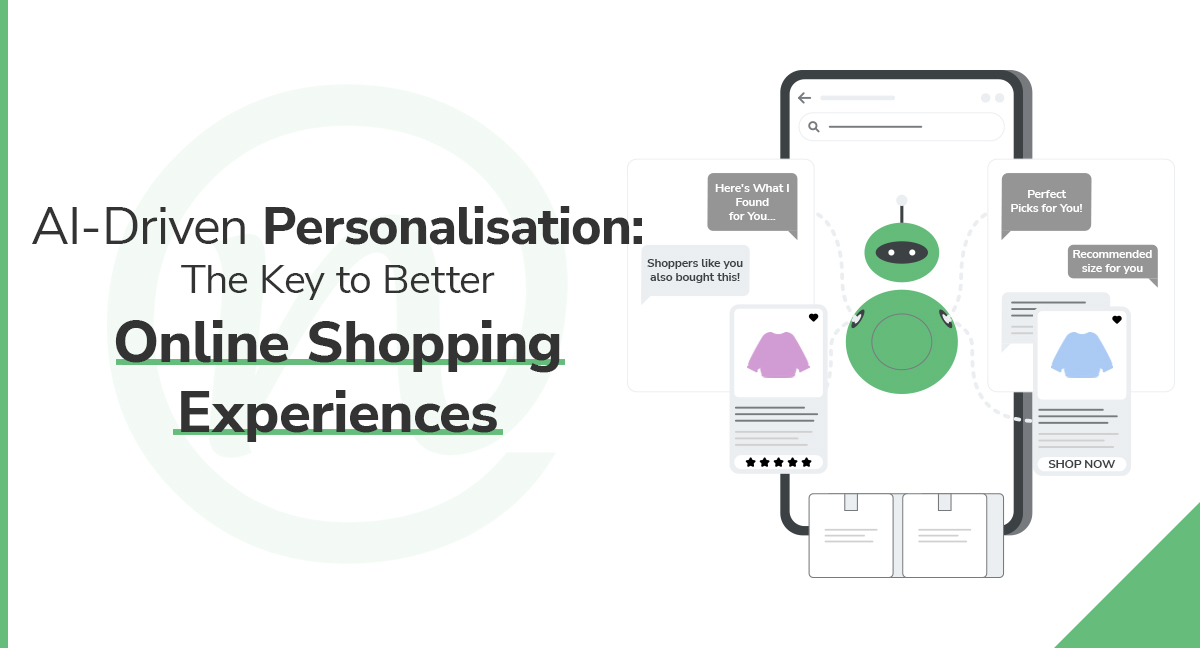
Imagine this – you walk into a crowded store with the intent to buy a product but are pushed around with no real help. Sounds frustrating, right?
Now picture this: the support staff knows you and your choices well and guides you effortlessly in getting the best product for yourself.
Which of these two scenarios would you prefer? Of course, the second!
In simple terms, that’s exactly what AI-driven personalisation in online retail feels like. You can now grow your e-commerce business and deliver customised results for every user who visits your online store.
In 2025, the AI breakthrough has completely changed the field of e-commerce. It can help you provide shopping experiences like never before.
AI enhances personalisation in online shopping by analysing user behaviour to offer tailored recommendations that urge them to make a purchase.
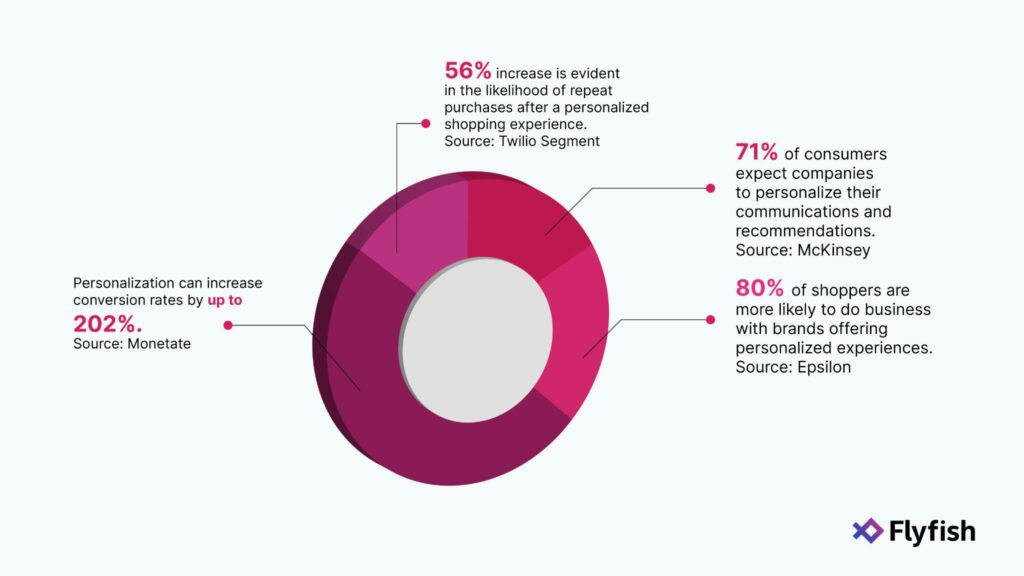
Source: Flyfish
Let’s start with these numbers
The benefits of AI personalisation include a 202% increase in conversion rates and 56% repeat purchases.
In 2025, 71% of users expect personalisation and 80% are more interested in engaging with a brand that offers it. This makes it all the more important for a brand to go for AI-based personalisation. After all, it can entirely redefine user experience in online retail.
In this read, we will discuss what AI-powered personalisation is, how it works, its benefits, and its applications in the field of e-commerce in 2025.
Let’s get started!
What is AI-driven personalisation?
Have you noticed how your smartphone knows what you want to buy before you do? That’s all thanks to AI-driven personalisation!
The use of AI in online retail has been increasing SIGNIFICANTLY.
It helps you analyse user behaviour and customise their shopping experiences based on the products they’ve viewed, liked, or even ignored!
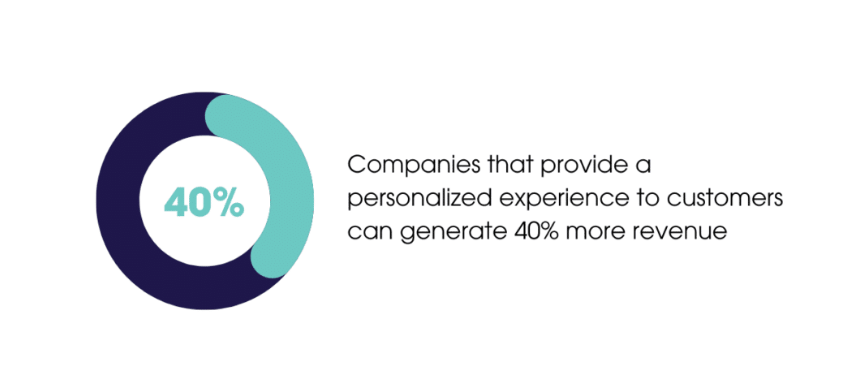
Source: Demand Sage
But we all know that online shopping wasn’t always this effortless and dynamic. It has definitely come a long way since static experiences that led to nowhere.
AI and machine learning in retail help brands create highly relevant shopping experiences tailored to EVERY. SINGLE. USER.
The benefits of AI-powered product recommendations and personalisations? Better user experience, engagement, conversions, and customer retention – but we’ll get to that.
For now, let’s move on to –
How AI-driven personalisation works
Step #1 Collecting data
AI algorithms collect user data such as demographics and psychographics, browsing history, previous purchases, CTRs, social media behaviour, and more.
This data collection plays a key role in helping AI identify patterns and trends.

Step #2 Analysing data & User Profiling
The next step in AI-powered e-commerce personalisation is analysing the data to profile the user based on their behaviour.
You can segregate users based on what they’re interested in and what products they’ve viewed or bought previously, to provide them a highly tailored experience.

Step #3 Predictive Analytics
Based on the current and past data analysis and profiling done in #2, predictive analytics helps make predictions for future trends.
AI can forecast user needs in real time to offer them customised product recommendations before they even know they need it! It’s like – reading their mind.
Step #4 Personalised recommendations
You can offer personalised product suggestions and go for targeted marketing purely based on data analysis and predictions.
Sounds like a proactive approach, right?
AI can also guide you through your purchase. Check this, for instance:

All these efforts to use AI in personalisation can have a number of benefits. Let’s read ahead to find out what they are.
Benefits of AI-driven personalisations
#1 Improved user experience
If you deliver a personalised experience with relevant suggestions, the user is likely to have an effortless browsing experience. It can also help them find exactly what they want.
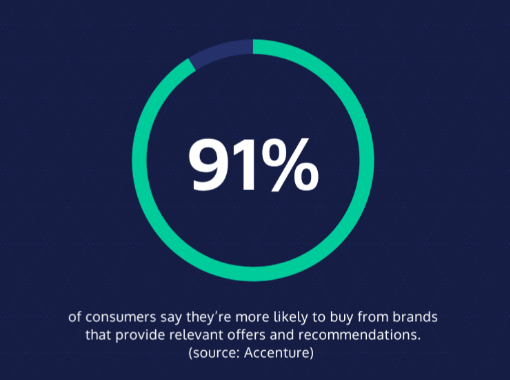
Source: Zendrive
Did you know? Almost 91% of users would buy from brands that offer relevant recommendations.
This makes the implementation of AI-driven personalisation absolutely necessary.
#2 Better engagement
It’s simple, really. If you provide a personalised experience to the user with relevant suggestions, they will interact with your brand more.
Hyper-personalisation creates a fine user experience for shoppers, making their browsing journey more pleasant. Such experiences can ensure that they engage with your brand better.
#3 Increased customer retention
It flows – better user experience leads to better engagement, which further leads to customer retention. Here’s how it works:
Efficiently utilising AI in e-commerce to personalise shopping experiences can lead to fewer people abandoning their carts.
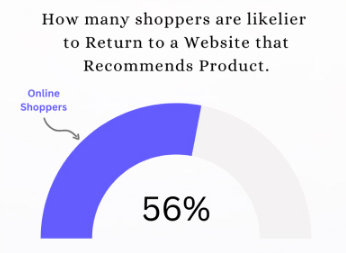
Source: Wisernotify
#4 Higher conversion rates
It goes without saying that conversion rates are bound to be higher if the personalised product suggestions are relevant. Offering users such personalisation reduces the burden of choices and guides them to make decisions faster.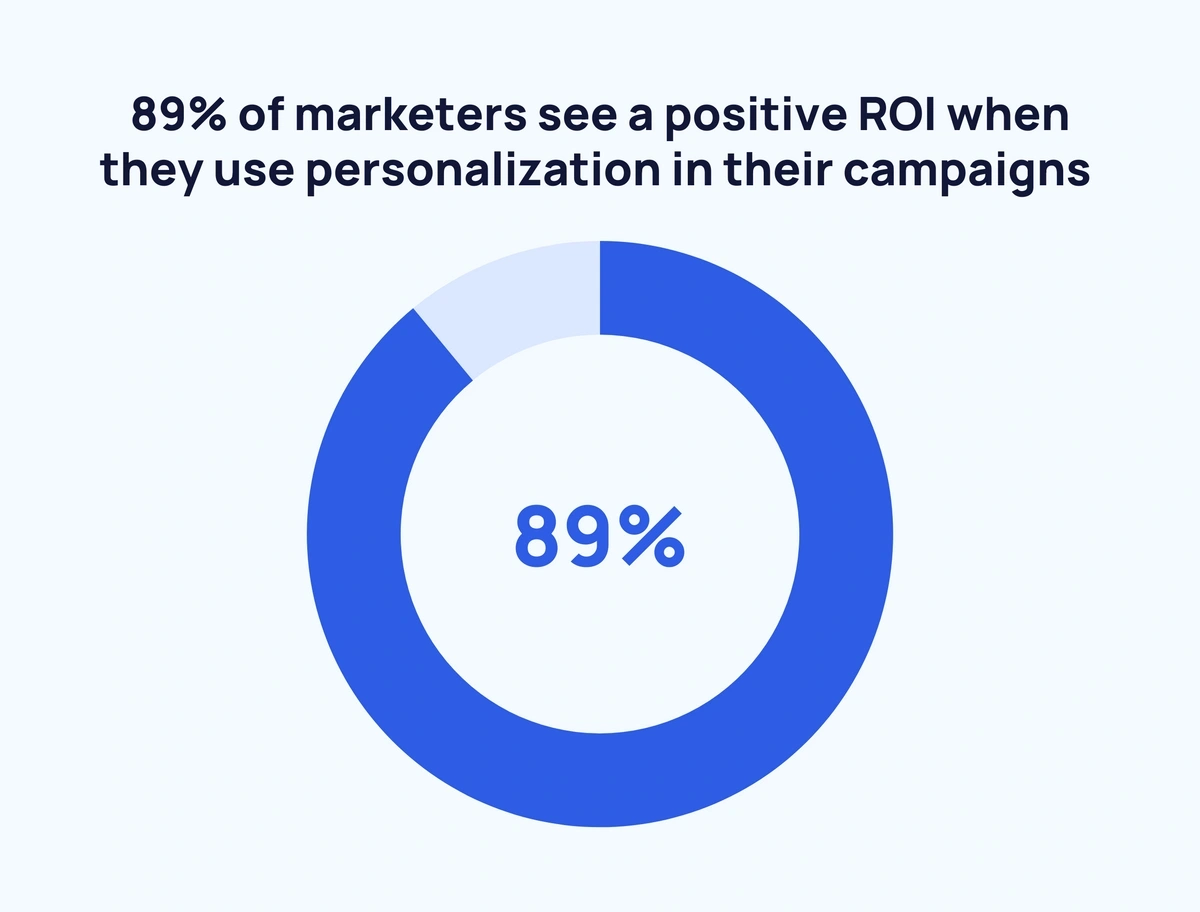
Source: Exploding topics
The future of AI-personalisation
Examples of AI-driven personalisation in e-commerce include tailored product recommendations, implementing chatbots on the website, offering Augmented Reality (AR) experiences, voice-optimised searches, and more.
Let’s check them out –
#1 Tailored product recommendations
AI-based personalisation already offers product suggestions to users, but it is expected to advance even more.
AI will offer hyper-personalised shopping experiences where it analyses data from various points to predict user needs and offer personalised recommendations, all in real-time.
According to experts, all product suggestions are expected to be deeply personal as AI will pick up on previous and current trends and predictive analytics.
It will soon be able to evaluate data beyond regular preferences and behaviours. It will consider context, intent, location, time, and even emotional cues.
You can also include AI-based strategies in your e-commerce SEO plans to boost your sales significantly.
This in-depth analysis will help it deliver hyper-personalised suggestions.
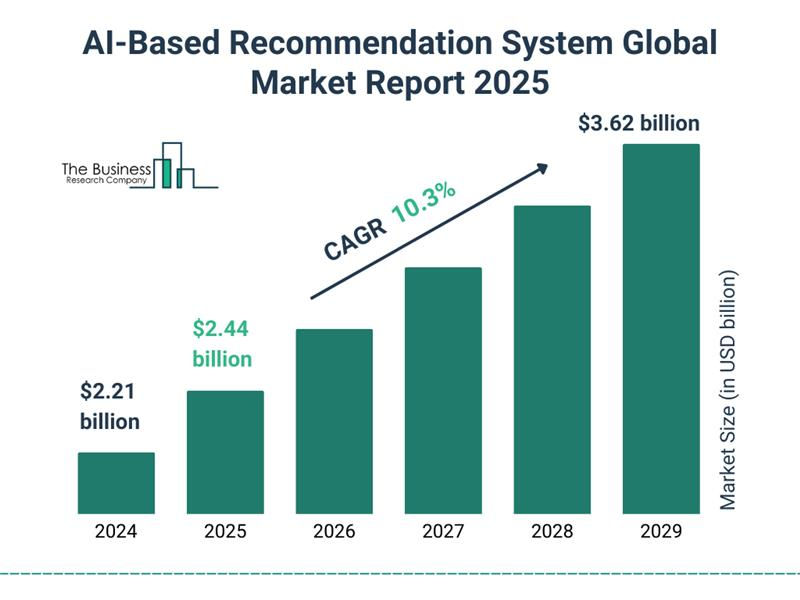
Source: The Business Research Company
As per a recent study, the AI-based recommendation system is growing at a CRAZY rate. It is expected to be $2.44 billion in 2025, with a growth rate of 10.3%.


#2 Chatbots
You can simply consider chatbots as AI-based customer service experts – they can offer all kinds of tailored support to user queries.
The use of AI in online retail can offer users the assurance of consistent support.
These chatbots improve the online shopping experience by providing tailored recommendations and round-the-clock assistance. This ensures that the customer is satisfied with their engagement with the brand.
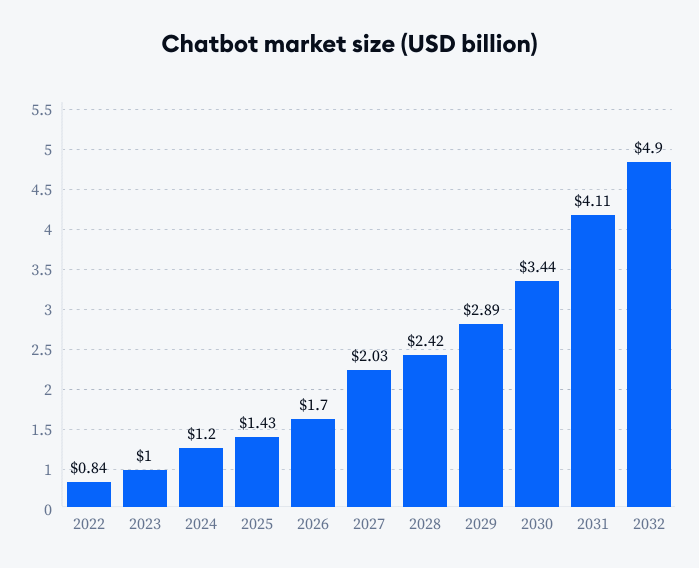
Source: Tidio
Research shows that in 2025, the chatbot market size is anticipated to be $1.43 billion, and is predicted to increase 4x in this decade.
To keep up with this trend, here’s what you need to do –
Integrate natural language processing in artificial intelligence with your chatbots for it to understand and respond to user queries efficiently.

#3 Augmented Reality experiences
Have you ever wanted to purchase lipstick, eyeglasses, or a lamp and discovered an option of trying it out before buying?
That’s right – it is an immersive AR experience that makes the user more confident about their purchase.
The use of augmented reality for retail websites is expected to increase even more
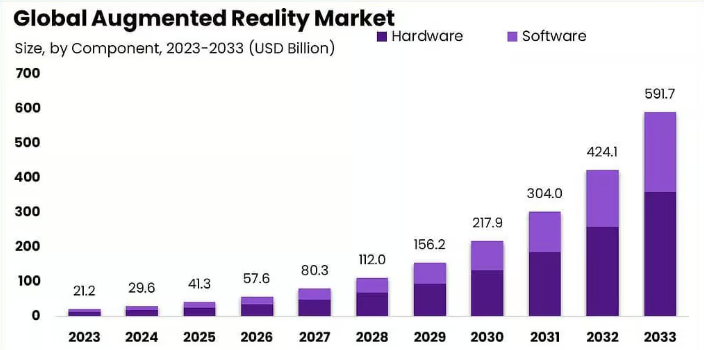
Source: Market.us
Here’s what the data reveals–
In 2025, the global AR market accounts for $41.3 billion, which is expected to reach $591.7 billion by 2033. Talk about a TREMENDOUS growth!
More and more e-commerce businesses are now implementing AI-based AR technology into their online stores for better engagement and conversions.

Final thoughts
To sum it all up, basic browsing is out of the window – the future is here with AI-driven personalisation!
You can offer hyper-personalised user experiences and product recommendations through AI. It can help e-commerce businesses to improve their sales and build deeper relationships with their customers.
So, have you implemented AI-powered personalisation yet?































